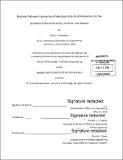Modular pathway engineering of microbial fatty acid metabolism for the synthesis of branched acids, alcohols, and alkanes
Author(s)
Sheppard, Micah J. (Micah James)
DownloadFull printable version (19.29Mb)
Other Contributors
Massachusetts Institute of Technology. Department of Chemical Engineering.
Advisor
Kristala L. J. Prather.
Terms of use
Metadata
Show full item recordAbstract
Historically, microbial platforms have been used to synthesize a variety of chemical products and potential biofuels. More recently, increasingly complex metabolic pathways have been engineered by using novel hosts, modifying natural pathways, and establishing de novo pathways with enzymes taken from a variety of pathway contexts. Highly reduced and branched alkyl chains are potentially interesting targets for both flavor and fragrance compounds and as liquid fuel components. Here we report the engineering of microbial fatty acid synthesis to provide both CoA-dependent and fatty acid synthase platforms for previously undescribed routes to medium-chain length, branched acids. Specifically we produced six-carbon 4-methyl-valeric acid via a CoA-dependent route and nine-carbon 7-methyloctanoic acid via a fatty acid synthase. Specific variants of the platform pathways were used to demonstrate synthesis of potential liquid fuel targets. The CoA-dependent platform was used to create a redox-neutral pathway to 4-methyl-pentanol with a maximum theoretical energy efficiency of 100%. Both platforms were used to demonstrate the first reported synthesis of short- and medium-chain alkanes from three to seven carbons.
Description
Thesis: Ph. D., Massachusetts Institute of Technology, Department of Chemical Engineering, 2014. Cataloged from PDF version of thesis. Includes bibliographical references (pages 130-141).
Date issued
2014Department
Massachusetts Institute of Technology. Department of Chemical EngineeringPublisher
Massachusetts Institute of Technology
Keywords
Chemical Engineering.